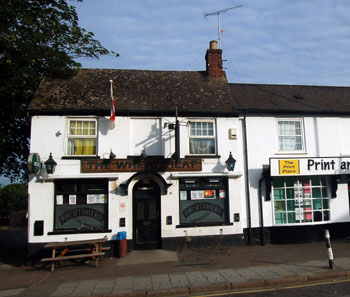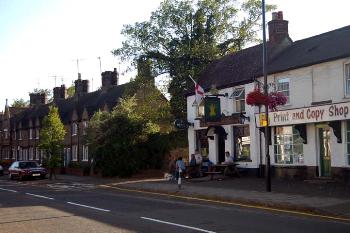The Wheatsheaf Public House Leighton Buzzard

The Wheatsheaf, June 2008
The Wheatsheaf Public House: 57 North Street, Leighton Buzzard
In the Northampton Mercury of 19th January 1793 licensee of the Wheatsheaf, Thomas Steward, subscribed to a resolution of Leighton Buzzard publicans banning "seditious and disaffected persons" from their houses. This presumably was in reaction to the events across the Channel in France (four days previously King Louis XVI had been sentenced to death and two days later he went to the guillotine). This is the first mention of the Wheatsheaf in the historical record.
Maureen Brown, June Masters and Tom Lawson wrote a book called The Old Pubs of Leighton Buzzard and Linslade which was published by Leighton Linslade Local History Research Group in 1994. In producing the book they used sources at Bedfordshire Archives, Buckinghamshire Record Office, Northamptonshire Record Office as well as a number of published sources.
In her notes, kindly lent to Bedfordshire Archives, Maureen Brown describes a cottage divided ito two tenements being surrendered by Newman Dell to Thomas Steward in 1762. He left the public house to his son, also Thomas, in 1798.
Thomas Steward junior made his will in 1803 [ref: PLBP/W1805/27] and it was proved in 1805. In it he left the Wheatsheaf to his wife Patty, for her life, then to their daughter Jenney. He also owned the Leathern Bottle next door, which he devised to another daughter Hannah Collings (whose husband is also listed as the licensee of the Wheatsheaf from at least 1822 until at least 1835), along with the barn and coalhole that had been shared with the Wheatsheaf. Another daughter, Ann, inherited cottages in Workhouse Lane [Baker Street] from him. Jenney died before her mother, having married Francis Sanders and devised the Wheatsheaf to her son Thomas after her mother's death.
In 1835 the Wheatsheaf became the northernmost point in the town to which the Lighting and Watching Act was applied [ref: CRT130Lei5]. The countywide Return of Licensed Premises of 1876 described the owner as George Franklin whereas by the time of the 1891 return it was Frederick Saunders of Workington [Cumberland], who leased it to brewer Benjamin Bennett of Harpenden [Hertfordshire]. The lease later passed to Louisa Charlotte Susannah Bennett of Dunstable before passing to Mann, Crossman & Paulin of Whitechapel [Middlesex], brewers. This out-county firm has deposited no records with Bedfordshire Archives and so the more recent history of the public house is represented in the archive mostly by licensing registers and directories. At the time of writing [2009] the Wheatsheaf is still a public house. Permission for a single storey rear extension was given in 1990

The Wheatsheaf, July 2006
List of Licensees: note that this is not a complete list; entries in italics refer to licensees where either beginning or end, or both, dates are not known:
1793: Thomas Steward;
1822: William Collins or Collings;
1839: Thomas Sanders or Saunders;
1876: Samuel Hopkins;
1879: Edwin Thomas Gresswell;
1892: Alfred Dimmock;
1893: William Field;
1903: John Brittain;
1909: Charlotte Brittain;
1910: Frank William Carpenter;
1911: Joseph Cantor;
1912: John William Lake;
1912-1914: James Bridge;
1914: William Parr;
1915: Frederick Hill;
1921: Holland Ambrose;
1923: William Turner;
1935: Frank Scraggs;
1966: William Cracknell;
1968: Reginald Hewett;
1972: Dennis Carling;
1975: Alan George Vickers;
1977: Ronald Peter Carroll;
1984: Antonio Ronetti;
1984: Geoffrey James Bottoms.
List of sources at Bedfordshire Archives:
- Northampton Mercury: resolution of Leighton Buzzard publicans banning "seditious and disaffected persons" from their houses: 19 Jan 1793;
- PLBP/W1805/27: Will of Thomas Steward: 1803, proved 1805;
- X1/34: shown on map of Leighton Buzzard: 1819;
- CLP13: Register of alehouse licences: 1822-1828;
- CRT130Lei5: The Wheatsheaf to be the end point for the Lighting and Watching Act enforcement in the town: 1835;
- PSLB4/1: Register of Alehouse Licences: c.1860s-1949;
- PSLB4/3: Register of Alehouse Licences: c.1860s-1956
- HN1/20-1-3: Position shown on annotated Ordnance Survey maps compiled for licensing purposes: early 20th century;
- P91/28/48: Indicated as being at 57 North Street in notes compiled on Leighton Buzzard public houses: early 20th century;
- PSLB4/2: Register of Alehouse Licences: 1922-1948;
- Z1105/1: Liquor Licence Trader Survey form: 1935